Free Online Productivity Tools
i2Speak
i2Symbol
i2OCR
iTex2Img
iWeb2Print
iWeb2Shot
i2Type
iPdf2Split
iPdf2Merge
i2Bopomofo
i2Arabic
i2Style
i2Image
i2PDF
iLatex2Rtf
Sci2ools
119
click to vote
DGO
2010
2010
Supporting agile modeling through experimentation in an integrated urban simulation framework
Decisions regarding major urban transportation projects and land use policies are frequently political and controversial, as well as having significant economic, social, and environmental consequences. UrbanSim is a disaggregate, behaviorally-realistic modeling environment that planning agencies can use to simulate the long-term effects of such decisions. We describe UrbanSim's evolution over the past decade from the perspective of supporting its appropriation by urban modelers, and identify support for experimentation as a key property that enables the adoption of an agile modeling methodology. Finally, we draw out three lessons for supporting agile modeling through experimentation: iterative development of models, providing appropriate domainspecific building blocks, and balancing the development of integrated tools versus interoperating with existing tools and the work practices that surround them. Keywords Simulation, urban modeling, agile modeling, appropriation, experimenta...
Agile Modeling | Agile Modeling Methodology | Behaviorally-realistic Modeling Environment | DGO 2010 | Education |
Related Content
| Added | 29 Oct 2010 |
| Updated | 29 Oct 2010 |
| Type | Conference |
| Year | 2010 |
| Where | DGO |
| Authors | Travis Kriplean, Alan Borning, Paul Waddell, Christoffer Klang, James Fogarty |
Comments (0)

